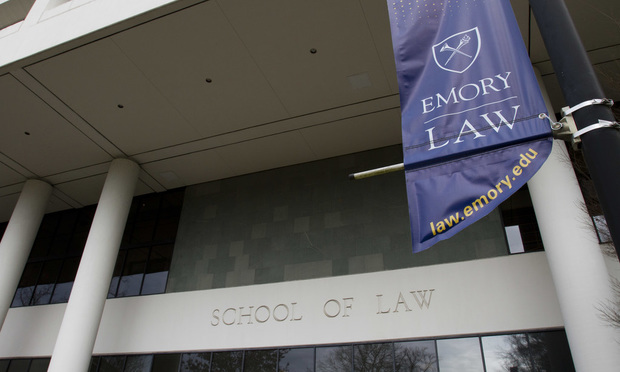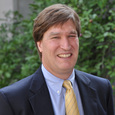Lawyers Speak Out Over Emory Law Prof's In-Class 'N-Bomb'
Three members of Advocacy for Action, an organization dedicated to supporting minorities' advancement in the legal profession, said the professor's use of the racial slur is unacceptable under any circumstances.
August 28, 2018 at 08:01 PM
5 minute read
 Emory School of Law, Atlanta (Photo: John Disney/ALM)
Emory School of Law, Atlanta (Photo: John Disney/ALM)
An Emory Law School professor is drawing fire from students and legal peers alike for his use of the “N-word” during a lesson with students during a first-year torts class.
Dean James Hughes Jr. stripped the instructor, Paul Zwier, of his class assignments pending an investigation following the incident. Zwier also released a three-page letter explaining how he came to apparently use the slur when discussing a 1967 case involving a black man who sued after being denied service at a Texas restaurant by a manager who “shouted that he, a Negro, could not be served in the club.”
In his letter to Emory faculty dated Aug. 17, Zwier wrote that he had previously wondered whether the man was actually called the “N-word,” adding he may have “misspoken” in class and used the toxic term or “mispronounced negro, or said something else.”
As reported in the Emory Wheel, law students are planning a 4 p.m. Wednesday “unity rally” to address the incident, and Zwier told the student paper he plans to attend. Zwier declined to discuss the incident with the Daily Report.
 Paul Zwier.
Paul Zwier.But some members of Atlanta's legal community, particularly those who have spent years speaking out in support of minority law students and calling for the appointment of black and female judges, said in separate emails that the incident is a reminder that there's still a long way to go.
Retired Fulton County Superior Court Judge Thelma Wyatt Cummings Moore said the incident is particularly painful for her.
“As an Emory Law graduate, former member of the Emory Board of Trustees and Board of Visitors, and as a citizen of these United States, I am outraged that a professor, who would seemingly have better judgment, would use the 'N-word' in any context,” Moore said.
“There is no question in my mind that the professor should be summarily terminated,” Moore said, adding that Zwier “displayed a total lack of respect for his students, our race, Emory as an institution and this country.”
“I recall my days at Emory where I was afraid to be a part of Dr. William Agnor's class, he being a native of Alabama and nicknamed 'Bull Agnor,'” Moore recalled.
“He turned out to be one of the most respectful and discerning professors I ever encountered at Emory,” Moore said. “He even called me back to join him as a professor of real property at Emory. That was 50 years ago!”
“Do we expect any less respect of professors today?”
“Thorough screening of professors and employees for their sensitivity to diversity should be performed, even on the same level as their so-called qualifications,” Moore said.
“Our country is sinking to the depths of hatred and racism, with the 45th president as a prime example,” she said.
Holland & Knight partner Charles Johnson III took a more measured tone, but agreed that Zwier crossed the line.
“Generally, speech on campus is becoming an increasingly contentious issue,” he said. “However, part of being able to function effectively in a diverse society requires that we choose our words, and (if the objective is to communicate clearly and without distraction) there is a growing consensus that some words are just not helpful under any circumstances.”
“Particularly meaningful to me was the statement from professor Zwier himself. He acknowledges that the use of the word was inappropriate, and he apologized for it,” Johnson said.
“What I find very odd is that the professor doesn't seem to recall whether he actually used the word. He had to be told by others that he had used the word. He says that, if he used the word, it was unintentional,” Johnson said. “At the same time, however, he seems to be suggesting that it might have been appropriate to use the word in his discussion of another case the next day.”
If so, Johnson said, “I disagree. Surely, he is articulate enough, and his vocabulary is sophisticated enough, to enable him to discuss the cases in question without the actual use of the word.”
If Zwier used the term unintentionally—“if it just slipped out, what does that say about him?” Johnson said.
AT&T in-house counsel Suzanne Ockleberry said she had “a serious issue with the professor using the word, particularly when it was not used in the case he was teaching the class about. I am not clear why he felt it appropriate to do so.”
“To me, it is the political climate that we appear to be in which seems to make it OK for people to believe it is OK to use such language,” Ockleberry said, pointing to the racist tirade caught on tape that led to the Aug. 24 resignation of Buford Public Schools Superintendent Geye Hamby.
“But tone originates from the top in most instances,” said Ockleberry, also pointing to the Trump administration. “I watched the clip of John McCain correct the woman who called [President Barack] Obama an Arab. We can agree to disagree, but we can do so civilly without name calling. That type of incendiary language denigrates us all.”
This content has been archived. It is available through our partners, LexisNexis® and Bloomberg Law.
To view this content, please continue to their sites.
Not a Lexis Subscriber?
Subscribe Now
Not a Bloomberg Law Subscriber?
Subscribe Now
NOT FOR REPRINT
© 2025 ALM Global, LLC, All Rights Reserved. Request academic re-use from www.copyright.com. All other uses, submit a request to [email protected]. For more information visit Asset & Logo Licensing.
You Might Like
View All

From 'Confusing Labyrinth' to Speeding 'Roller Coaster': Uncertainty Reigns in Title IX as Litigators Await Second Trump Admin
6 minute read
University of Georgia School of Law Finds Next Dean on Its Own Faculty
3 minute read
Teen Charged in Barrow School Shooting and His Father to Stay in Custody After Hearings
5 minute readTrending Stories
- 1Uber Files RICO Suit Against Plaintiff-Side Firms Alleging Fraudulent Injury Claims
- 2The Law Firm Disrupted: Scrutinizing the Elephant More Than the Mouse
- 3Inherent Diminished Value Damages Unavailable to 3rd-Party Claimants, Court Says
- 4Pa. Defense Firm Sued by Client Over Ex-Eagles Player's $43.5M Med Mal Win
- 5Losses Mount at Morris Manning, but Departing Ex-Chair Stays Bullish About His Old Firm's Future
Who Got The Work
J. Brugh Lower of Gibbons has entered an appearance for industrial equipment supplier Devco Corporation in a pending trademark infringement lawsuit. The suit, accusing the defendant of selling knock-off Graco products, was filed Dec. 18 in New Jersey District Court by Rivkin Radler on behalf of Graco Inc. and Graco Minnesota. The case, assigned to U.S. District Judge Zahid N. Quraishi, is 3:24-cv-11294, Graco Inc. et al v. Devco Corporation.
Who Got The Work
Rebecca Maller-Stein and Kent A. Yalowitz of Arnold & Porter Kaye Scholer have entered their appearances for Hanaco Venture Capital and its executives, Lior Prosor and David Frankel, in a pending securities lawsuit. The action, filed on Dec. 24 in New York Southern District Court by Zell, Aron & Co. on behalf of Goldeneye Advisors, accuses the defendants of negligently and fraudulently managing the plaintiff's $1 million investment. The case, assigned to U.S. District Judge Vernon S. Broderick, is 1:24-cv-09918, Goldeneye Advisors, LLC v. Hanaco Venture Capital, Ltd. et al.
Who Got The Work
Attorneys from A&O Shearman has stepped in as defense counsel for Toronto-Dominion Bank and other defendants in a pending securities class action. The suit, filed Dec. 11 in New York Southern District Court by Bleichmar Fonti & Auld, accuses the defendants of concealing the bank's 'pervasive' deficiencies in regards to its compliance with the Bank Secrecy Act and the quality of its anti-money laundering controls. The case, assigned to U.S. District Judge Arun Subramanian, is 1:24-cv-09445, Gonzalez v. The Toronto-Dominion Bank et al.
Who Got The Work
Crown Castle International, a Pennsylvania company providing shared communications infrastructure, has turned to Luke D. Wolf of Gordon Rees Scully Mansukhani to fend off a pending breach-of-contract lawsuit. The court action, filed Nov. 25 in Michigan Eastern District Court by Hooper Hathaway PC on behalf of The Town Residences LLC, accuses Crown Castle of failing to transfer approximately $30,000 in utility payments from T-Mobile in breach of a roof-top lease and assignment agreement. The case, assigned to U.S. District Judge Susan K. Declercq, is 2:24-cv-13131, The Town Residences LLC v. T-Mobile US, Inc. et al.
Who Got The Work
Wilfred P. Coronato and Daniel M. Schwartz of McCarter & English have stepped in as defense counsel to Electrolux Home Products Inc. in a pending product liability lawsuit. The court action, filed Nov. 26 in New York Eastern District Court by Poulos Lopiccolo PC and Nagel Rice LLP on behalf of David Stern, alleges that the defendant's refrigerators’ drawers and shelving repeatedly break and fall apart within months after purchase. The case, assigned to U.S. District Judge Joan M. Azrack, is 2:24-cv-08204, Stern v. Electrolux Home Products, Inc.
Featured Firms
Law Offices of Gary Martin Hays & Associates, P.C.
(470) 294-1674
Law Offices of Mark E. Salomone
(857) 444-6468
Smith & Hassler
(713) 739-1250






